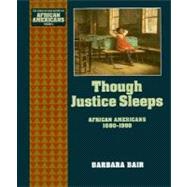Though Justice Sleeps African Americans 1880-1900
, by Bair, Barbara- ISBN: 9780195093438 | 0195093437
- Cover: Hardcover
- Copyright: 4/3/1997
The period of Reconstruction that followed the end of the Civil War was a time of both tremendous promise and the deep conflict of ideas. At stake was the question of what the racial future of America would be. In the years between 1880 and 1900, the wonderful promise of a future of freedom that was made to black people by emancipation was broken. It was a promise that African Americans could conduct their daily lives with the assurance that their rights would be protected--the assurance of wide-awake and diligent social justice. Instead, justice slept. African Americans did, however, make their own brand of liberty through their activism and their faith. When John Solomon Lewis's family claimed their own land in Kansas, or Bishop Henry McNeal Turner encouraged African Americans to take pride in Africa, the flame of freedom was maintained. When Richard L. Davis organized mineworkers, or black women in New Orleans marched in the streets in support of striking dockworkers, they kindled the light of freedom that illuminated their path. When Booker T. Washington arrived in Tuskegee, Alabama, and started a school in Johanna Bowen Rudgrey's church, that light was further kindled. The message that African-American activists of the 1880s and 1890s left for those in the 20th century was a clear one. Frances Harper said it at the Chicago Women's Congress in 1893: "Demand justice, simple justice, as the right of every race." In Though Justice Sleeps , Barbara Bair demonstrates that black people were more than victims of Jim Crow laws and racial violence. She shows that they organized, fought back, moved around, thought, wrote, and created works of art. They connected their struggles with the rest of the world, turning to Africa, Europe, and the Caribbean for guidance and inspiration.






